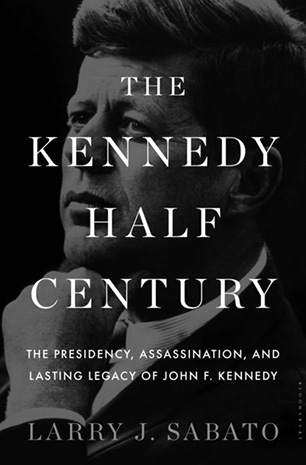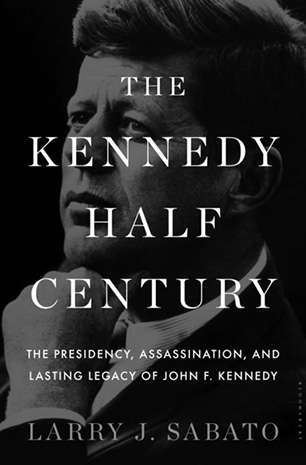Support justice-driven, accurate and transparent news — make a quick donation to Truthout today!
Following is an excerpt from the book, The Kennedy Half-Century: The Presidency, Assassination, and Lasting Legacy of John F. Kennedy by Larry J. Sabato.
 (Image: Bloomsbury USA)Kennedy’s final days paint a picture of a man who craved excitement. Perhaps because two of his siblings, Joe and Kathleen, had died young and the president himself had repeatedly faced death – as a youth, in World War II, and after a back operation in the 1950s – JFK seemed unusually conscious that his time on earth was fleeting. Kennedy could be humorously morbid, joking about the best ways to die (war and poisoning were his choices) and how short his life would be (he once guessed he would make it to 45, only a year off the final mark). He strove to secure a place in the history books before it was too late. Friend and foe alike agree that John Kennedy seized every moment, embraced every challenge, and lived life to its absolute fullest. This restless ambition sometimes produced great blessings for the nation. In September 1963 the Senate approved his Atmospheric Test Ban Treaty; never again would the Soviet Union or the United States detonate nuclear devices above ground. According to Ted Sorensen, “No other single accomplishment in the White House ever gave him greater satisfaction.” The treaty helped preserve the environment and also reduced tensions between the two superpowers, while paving the way for future Cold War agreements.
(Image: Bloomsbury USA)Kennedy’s final days paint a picture of a man who craved excitement. Perhaps because two of his siblings, Joe and Kathleen, had died young and the president himself had repeatedly faced death – as a youth, in World War II, and after a back operation in the 1950s – JFK seemed unusually conscious that his time on earth was fleeting. Kennedy could be humorously morbid, joking about the best ways to die (war and poisoning were his choices) and how short his life would be (he once guessed he would make it to 45, only a year off the final mark). He strove to secure a place in the history books before it was too late. Friend and foe alike agree that John Kennedy seized every moment, embraced every challenge, and lived life to its absolute fullest. This restless ambition sometimes produced great blessings for the nation. In September 1963 the Senate approved his Atmospheric Test Ban Treaty; never again would the Soviet Union or the United States detonate nuclear devices above ground. According to Ted Sorensen, “No other single accomplishment in the White House ever gave him greater satisfaction.” The treaty helped preserve the environment and also reduced tensions between the two superpowers, while paving the way for future Cold War agreements.
Moreover, JFK convinced the country that, however huge the obstacles, it could land a man on the moon. Twenty-four hours before he died, Kennedy spoke at the Aerospace Medical Health Center in San Antonio, where he encouraged his fellow citizens to keep their eyes on the heavens:
We have a long way to go. Many weeks and months and years of long,
tedious work lie ahead. There will be setbacks and frustrations and
disappointments. There will be, as there always are, pressures in this
country to do less in this area as in so many others, and temptations
to do something else that is perhaps easier. But this research here
must go on. This space effort must go on. The conquest of space must
and will go ahead. That much we know. That much we can say with
confidence and conviction.
Other, small achievements toward the conclusion of the Kennedy presidency are often overlooked but deserve mention. After standing up to Soviet aggression in Cuba, Kennedy offered his enemy an olive branch when the threat diminished. In October 1963, he authorized the sale of American wheat to the Soviets in order to help them cope with a poor harvest. The same month, while Congress debated his civil rights bill, the President’s Commission on the Status of Women issued its final report. In response, JFK created the Interdepartmental Committee on the Status of Women and the Citizens’ Advisory Council on the Status of Women. Both committees “provided ongoing leadership” on gender issues which, according to some Kennedy advocates, helped usher in the modern women’s rights movement. Kennedy’s New Frontier agenda also included the Equal Pay Act, signed by JFK in June 1963, which claimed to eliminate pay inequities based on gender. In practice, it had little effect in most economic sectors until strengthened by court decisions in the 1970s and further congressional action in subsequent administrations. Otherwise, Kennedy produced few advances for women in politics or government. His cabinet, for example, did not include a single woman, and he was certainly no feminist in his professional or private life. Offsetting his accomplishments, JFK had a much darker side. The same internal fire that fueled his political success could also burn out of control. A 10-year-old John Kennedy had once noted in a letter to his father (requesting an allowance increase) that he had “put away childish things.” He achieved that goal in many areas of life, but not in his irresponsible relationships with young, beautiful women. In July 1963, FBI director J. Edgar Hoover informed Bobby Kennedy that he knew about the president’s past relationship with an alleged East German spy named Ellen Rometsch. The wife of an army officer who had been assigned to the West German embassy, Rometsch supplemented her income by turning tricks for Washington’s best and brightest. Her pimp was a high-profile Senate aide named Bobby Baker, who had close ties to Lyndon Johnson. In late August 1963, Rometsch was flown back to Germany on a US Air Force transport plane at the behest of the State Department. According to author Seymour Hersh, she was accompanied by LaVern Duffy, one of Bobby Kennedy’s colleagues from his days on the McClellan Committee. Records related to Rometsch’s deportation have either vanished or were never created in the first place.
As the Rometsch case demonstrates, Kennedy’s unrestrained sexual appetite threatened his personal and political safety. It also alienated some of the men who were assigned to protect him. Larry Newman remembered the “morale problems” that the president’s indiscretions caused among his fellow Secret Service agents. “You were on the most elite assignment in the Secret Service, and you were there watching an elevator or a door because the president was inside with two hookers,” said Newman. “It just didn’t compute. Your neighbors and everybody thought you were risking your life, and you were actually out there to see that he’s not disturbed while he’s having an interlude in the shower with two gals from Twelfth Avenue.” Newman also remembered joking with his colleagues about which one of them would testify on Capitol Hill if and when “the president received harm or was killed in the room by these two women.” Kennedy had affairs with scores of other women, including two White House interns nicknamed “Fiddle” and “Faddle,” Pamela Turnure (Jackie’s personal secretary, whom JFK had conveniently encouraged her to hire), and Mary Meyer, a prominent Georgetown artist who was the “niece of Gifford Pinchot, the conservationist and Teddy Roosevelt’s chief forester.” JFK probably also had an affair with Marilyn Monroe. Although Kennedy’s strongest supporters have denied the relationship, pointing out there is no absolute proof, the behavior fit the president’s pattern, and he had opportunities to pursue it. Both Kennedy and Monroe discussed the encounters with friends, and they were in at least one secluded place together.
The well-supported story of Mimi Alford, a 19-year-old White House intern at the time of her involvement with JFK, is impossible to overlook. Initiated into JFK’s sexual world just four days into her internship, Alford lost her virginity to Kennedy as he conducted what can only be called a deeply inappropriate affair with a young charge; it even included a Kennedy-directed episode of oral sex with aide Dave Powers while Kennedy watched. This behavior, barely hidden from others within the White House and involving government resources to shuttle Alford to and from the traveling president, has caused some to question Kennedy’s basic fitness for the highest office. Many have tried to reconcile JFK’s high-minded, skilled public persona with his sleazy, reckless private self. It is simply impossible to match up the two sides rationally, and it is certainly inadequate to say that the rules of his time or a sometimes empty marriage permitted or justified these escapades. Any private citizen with modest responsibilities would be condemned for them, and as president, JFK risked his White House tenure, the welfare of his party, his policy goals, and everyone he supposedly held dear.
Jackie was European in outlook, and while aware of some of her husband’s philandering, she apparently tried to tolerate it as Continental wives had done for centuries. The late Robert Pierpoint, the White House correspondent for CBS television during the Kennedy years, once recalled an episode that revealed Mrs. Kennedy’s matter-of-fact acceptance of JFK’s bold unfaithfulness:
I was sitting in the White House press room one day shortly after
noon. And through the corridor came a French magazine correspondent
who worked for Paris Match, and he said, “Bob, I’ve just had a
very unusual experience. I have to tell somebody about it.” He was
somewhat agitated and said that he had been invited to have lunch
with Jackie upstairs in the private area, and the president joined
them, and then after lunch the president said, “Jackie, why don’t you
show our friend around?” She did, and brought him over to the west
wing. Between the cabinet room and the Oval Office there is a small
room where the secretaries sit. As she ushered him into that room
she said in French, “And there is the woman that my husband is supposed
to be sleeping with.” He was quite upset and didn’t know what
to answer; it was kind of embarrassing for him.
Although the president’s infidelities often put a terrific strain on his marriage, he and Jackie appeared to reconcile after their infant son Patrick Bouvier died in August 1963. Born with a severe lung problem, Patrick survived for only two days. Afterward, a close friend saw the president – deeply distraught and openly weeping after his son’s death – holding Jackie in his arms, “something nobody ever saw at the time because they were very private people.” That autumn, close observers said they detected renewed affection in this most enigmatic of public-private couples. Though anyone would be skeptical, given long past practice, perhaps JFK’s views and behavior were changing in this realm as well. There would not be enough time to find out.
A complete list of sources can be found in the book. The above excerpt is a digitally scanned reproduction of text from print. Although this excerpt has been proofread, occasional errors may appear due to the scanning process. Please refer to the finished book for accuracy.
Copyright © 2013 Larry J. Sabato, author of The Kennedy Half-Century: The Presidency, Assassination, and Lasting Legacy of John F. Kennedy
Trump is silencing political dissent. We appeal for your support.
Progressive nonprofits are the latest target caught in Trump’s crosshairs. With the aim of eliminating political opposition, Trump and his sycophants are working to curb government funding, constrain private foundations, and even cut tax-exempt status from organizations he dislikes.
We’re concerned, because Truthout is not immune to such bad-faith attacks.
We can only resist Trump’s attacks by cultivating a strong base of support. The right-wing mediasphere is funded comfortably by billionaire owners and venture capitalist philanthropists. At Truthout, we have you.
Truthout has launched a fundraiser to raise $34,000 in the next 5 days. Please take a meaningful action in the fight against authoritarianism: make a one-time or monthly donation to Truthout. If you have the means, please dig deep.
